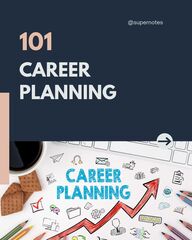
Return to flip book view
CAREER PLANNING 101@supernotes
A SUCCESSFUL CAREER IS RARELY THE RESULT OFCHANCE. TO BUILD ONE AND ENJOY ITS REWARDS,TIME MUST BE INVESTED IN REFLECTING ONGOALS AND THE PATHS TO ACHIEVING THEM.CAREER PLANNING IS CONSIDERED ESSENTIAL, ASIT PROVIDES DIRECTION AND CLARITY REGARDINGFUTURE ASPIRATIONS. STRENGTHS ANDWEAKNESSES CAN BE IDENTIFIED, ALONG WITHTHE SKILLS AND KNOWLEDGE NECESSARY TOREACH LONG-TERM GOALS.JOIN THIS WALK-THROUGH, WHERE WE HAVECURATED STEPS TO HELP GUIDE YOUR CHILDRENIN MAKING INFORMED DECISIONS ABOUT THEIRCAREER PATHS, ENSURING THEY ARE WELL-EQUIPPED FOR THE FUTURE.@supernotes
TABLE OF CONTENT01.02.CHANGING TRENDS PLANNNG PROCESS 03.PLANNING TOOLS04.PROFILE BUILDING
DISRUPTIVE GLOBAL COMPETITION, CHANGING CAREER TRENDS, AND THE RISE OF AI@supernotesThe career landscape is undergoing significant shifts due to variousforces, each of which has broad implications for how we work, the skillswe need, and the types of careers that will thrive in the future.CHANGING THE FACECAREERS IN 21 CENTURY
CHANGING THE FACECAREERS IN 21 CENTURY@supernotesThe "Career Jungle Gym" is a metaphor for aflexible approach to career growth. Instead ofthinking of your career as a ladder you climbone step at a time, it’s more like a jungle gymwhere you can move in different directions,trying new roles and skills along the way
02.PLANNNG PROCESS
THE PLANNING BEGINSWITH YOUKnowing yourself sets the stage for choosing careers that are right foryou. It makes sense to choose a career that fits your personalitystrengths, values, interests, and skills.@supernotesKnow Yourself: Identify what you're good at, where you struggle, whatexcites you, and what matters most to you.Explore Possibilities: Look into various career options that match yourstrengths, interests, and values.Evaluate Options: Think about the job market, potential salaries, andany necessary education or skills.Make a Choice: Choose the career path that feels right for you basedon your research.Create a Roadmap: Set clear goals for the short and long term, andmake a plan to reach them.
THE PLANNING BEGINSWITH YOUKnowing yourself sets the stage for choosing careers that are right foryou. It makes sense to choose a career that fits your personalitystrengths, values, interests, and skills.@supernotes
DETERMINING INTERESTSAND PERSONALITY@supernotesKnowing about yourself is the basis of career decision-making. What areyour interests, skills, and values? What is important to you about yourwork? What are your personal traits and characteristics? Ask yourself:What do I like to do?What do I value?What motivates me? What keeps my curiosity?What skills do I possess? What new ones can I develop?The most successful people start with dominant talent—and thenaddskills, knowledge, and practice to the mix.When they do this, the rawtalent actually serves as a multiplier.” “You cannot be anything you wantto be —but you can be a lot more of who you already are.”People who choose a career or majorthat matches or is similar to theirpersonality or interest type are morelikely to be successful and satisfied.According to Gallup, People who tapinto their strengths at work are sixtimes more likely to be engaged, .
@supernotesHOLLAND'S SIXPERSONALITY TYPESThe Holland codes, or RIASEC types, werecreated by psychologist John Holland. Hebelieved that knowing your personalitytype can help you find a career that fitsyour strengths and work style. Whenpeople find a career that matches theirpersonality, they tend to be happier andmore productive at work.Realistic (Doers) (hands on)People with realistic interests value practical things you can see andtouch and like practical, hands-on work activities. They like workingwith plants, animals, and real-world materials such as wood, tools,and machinery. They often enjoy working outside. Investigative (Thinkers) ( Problem Solvers)People with investigative interests like work that has to do with ideasand thinking rather than physical activity or leading people. They likesearching for facts and figuring out problems
THE OCCUPATIONALEXPLORATION@supernotesOccupational exploration is an important step in college planning anddrafting a career road map. It involves researching and understandingthe different majors available to study, the job opportunities thesemajors can lead to, and how these opportunities fit into your careergoals
03.PLANNNG TOOLS
KNOW ABOUTTHE PLANNING TOOLSPSYCHOMETRIC TESTA psychometric test is anobjective way to measure thepotential ability of candidates toperform well in a job role. Psychometric tests measure arange of skills from cognitiveabilities, knowledge to assessingyour personality.VIRTUAL INTERNSHIPSTVirtual internships are afantastic way for teens to diptheir toes into the world of workand explore different careerpaths. Test drive careers: See if anindustry is a good fit without along commitment.@supernotes
04.PROFILE BUILDING
TEN 21ST-CENTURY SKILLS EVERYSTUDENT NEEDSIMPORTANCE OFHOLISTIC PROFILE @supernotesThrough holistic review, schools look at academic performance pairedwith extracurricular activities, non cognitive traits, personalexperiences, etc. A recent report described the holistic process as a “means to lookbeyond just the objectives like test scores and GPA to really try to getto know the applicant as a student and as a person
LEARN ABOUTSTATEMENTOF PURPOSE (SOP)@supernotesA statement of purpose (SOP) is your chance to sell yourself to gradschools. It's an essay that shows: Why you're passionate about aspecific field and program. How you're qualified with your skills andexperiences. What you'll bring to the program (unique perspective, etc.).KEY COMPONENTS OF A SUCCESSFUL SOP INCLUDE:Clarity of purpose: Clearly articulate your goals and reasons forpursuing graduate studies.Unique differentiation: Highlight your distinctive qualities,experiences, and perspectives.Relevant experience: Demonstrate how your past experiences alignwith the program's requirements and your academic goals.Effective communication: Write in a clear, concise, and engagingstyle that showcases your writing skills.Fit with the program: Clearly explain how your goals and aspirationsalign with the program's mission and objectives.
@supernotesD i d y o u k n o w ?99 % of Schools in Indiadon't have CareerCounselorsOnly 3 out of 10 studentsare clear about the careerpath they wish to pursue.As per the study, 93% ofIndian students are awareonly 7 career options